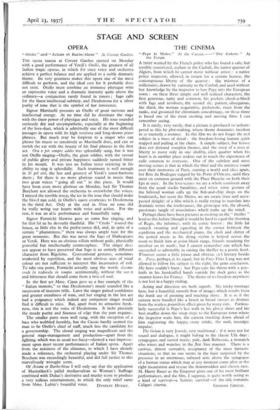" Otello" and " Ariane et Barhe-bleue " At Covent
Garden.
STAGE AND SCREEN
OPERA Tim opera season at Covent Garden opened on Monday with a good performance of Verdi's Otello, the greatest of all Italian tragic operas, in which for once voice and orchestra achieve a perfect balance and are applied to a noble dramatic theme. Its very greatness makes this opera one of the most difficult to perform, and the ideal cast for it probably does not exist. Otello must combine an immense physique with an expressive voice and a• dramatic intensity quite above the ordinary—a conjunction rarely found in tenors ; Iago calls for the finest intellectual subtlety, and Desdemona for a silver purity of tone that is the symbol of her innocence.
Signor Martinelli presents an Otello of great nervous and intellectual energy. At no time did he dominate the stage with the sheer power of physique and voice. His tone sounded curiously dry and unsympathetic, especially at the beginning of the love-duet, which is admittedly one of the most difficult passages in opera with its high tessitura and long-drawn piano phrases. But much may be forgiven to a singer who can phrase his music so sensitively as Martinelli does, and can so ravish the ear with the beauty of his final phrases in the first act. Ora e per sempre addio was splendidly sung, but it was not Otello singing—Otello, the great soldier, with the savour of public glory and private happiness suddenly turned bitter in his mouth. It was just an Italian tenor rejoicing in his ability to sing it splendidly. Such treatment is well enough in Si pel del, the last and greatest of Verdi's tenor-baritone duets ; for there is no more glorious sound in music than two great voices " going all out " in this piece. It would have been even more glorious on Monday, had Sir Thomas Beecham not allowed the orchestra to overwhelm the voices. I missed the terrible irony, the ice in the tone that should make the blood run cold, in Otello's suave courtesies to Desdemona in the third Act. Only at the end in Niun mi tema did he really wring our hearts with voice and action. For the rest, it was an able performance and beautifully sung.
Signor Formichi likewise gave us some fine singing, and for that •let us be devoutly thankful. His " Credo " roused the house, as little else in the perfor.nance did, and, in spite of a certain " pltmuniness," there was always ample tone for the great moments. But this was never the Iago of Shakespeare or Verdi. Here was an obvious villain without guile, physically powerful but intellectually commonplace. The singer dozy not appear to have perceived that Iago is an entirely different character from Rigoletto. Conventional gestures, sometimes weakened by repetition, and the most obvious uses of vocal colour are not sufficient to interpret this incarnation of evil. To take one point, Formichi actually sang the words siccome crede la vedovela in tempio sentimentally, without the sco: n and bitterness that should come from a taa is led soul.
In the first act Mme. Ciana gave us a fine example of the " Italian tremolo," so that Desdemona's music sounded like a succession of insecure trills. Later the singer gained confidence and greater steadiness of tone, and her singing in the last act had a poignancy which indeed any competent singer would find it difficult to miss. But, apart from its attractive fresh- ness, this is not the voice of Desdemona. It lacks precisely the steady purity and fineness of edge that the part requires.
The smaller parts were well sung, with the exception of a bass who wobbled horribly, but the Cassio hardly seemed the man to be Otello's chief of staff, much less the candidate for a governorship. The choral singing was magnificent and the general stage-management and production—apart from the lighting, which was as usual too fussy—showed a vast improve- ment upon most recent performances of Italian opera. Apart from the noisiness of the rlimaxes, to which I have already made a reference, the orchestral playing under Sir Thomas Beecham was exceedingly beautiful, and did full justice to this marvellously wrought score.
Of Ariane et Barbe-bleue I will only say that the application of Maeterlinck's pallid mediaevalism to Woman's Suffrage combined with Dukas's derivative and mushy score to produce a very tedious entertainment, in which the only relief came from Mme. Lubin's beautiful voice. DYNELEY HUSSEY.










































 Previous page
Previous page